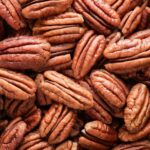U.S.: NatureSeal sees bright future for Latin American fresh-cut sector

A Connecticut-based company focused on shelf-life extension and convenience-oriented produce items sees Latin America's fledgling fresh-cut produce sector as holding "very big potential" in the near future, as it continues to expand its client base across the continent.

Eric Fernandes and A.J. Martinich.
Speaking with www.freshfruitportal.com during the Produce Marketing Association (PMA) Fruittrade Latin America event last week, NatureSeal sales director A.J. Martinich said McDonald's' adoption of sliced apples in 2004 helped legitimize the category in the U.S.
"I think what you’re seeing [in Chile] is like in the U.S. in its infancy - you go back to the late 90s and the early 2000s, people were trying different things and there was often an off taste associated with it, with apples especially," Martinich said.
"I know we’re selling some product down here. It hasn't rolled out to the major chains yet but to a small degree it has - we have a customer in Valdivia in the south of Chile, who is actually slicing apples using NatureSeal and now shipping to some Jumbo stores here in Santiago.
"The good news is we’ve gone through a whole lot of trials and tribulations in this fresh-cut industry; we know where the pitfalls are, and I think that the entry will be much quicker here once we get going."
Martinich and his colleague Eric Fernandes have been traveling to trade events in Chile for many years now, viewing the country as something of a gateway to the South American market.
"We feel like it's emerging and we realize the population may be much smaller than somewhere like the U.S., maybe the expendable income isn’t there, but I think the idea of value-added products like the ones we’re seeing in the U.S. will emerge and become a substantial and profitable category for the retailer here," Martinich said.
While Chile is an important focus, Brazil is logically the leading market for NatureSeal in the region due to its sheer population size, while the team is banking on other opportunities as well.
"As far as sales in Peru we haven't had many yet, but we have a few prospects that we’re going to revisit this week that should lead to new business.
"We’ve opened up new processors in Argentina and Brazil, we've got another hot prospect in Ecuador that we hope to see soon, and maybe we'll have Colombia right around the corner."
Taking the plunge into fresh-cut
As an example, Martinich walked www.freshfruitportal.com through what potential partners in the region could expect in dealing with his company.
"The first thing we do is sign a mutual confidentiality agreement, which protects whatever we're working on between us. Once that's signed, we send the prospective customer samples, depending on what they want to treat," he said.
"They test them back home in their facilities with their fruit or vegetable – if they like the results, then we would probably scale up and do a more sizable sample and then do a plant trial.
"A lot of the time what works on the bench doesn't translate to a successful plant run, so we want to make sure that using their equipment does work and it gives the finished product they want. Once that happens it's usually a no-brainer – it's working, they become a customer."
The executive said the company's scientists worked with the United States Department of Agriculture (USDA) in a collaborative research effort, and produced a vitamin-mineral blend that stopped oxidation and maintained the food's texture "without imparting any off taste at all".
"We patented it with the USDA so we are actually co-patent holders of this product. So for every pound of product we sell, we actually pay the USDA a royalty," he said.
When asked about which crops had the most promise in the fresh-cut category, Martinich pointed to potatoes and avocados.
"The consumption rate has increased tremendously in avocados so we’re trying to take advantage of that, as are our customers, and offer different modes - chunked, cubed and also guacamole."









































